
News |
- Clayoquot Sound to be Logged?
- Alberta Boreal Forest Species - Extinction Predicted
- Canadians to Build Climate Plan
- Labrador Métis Court Victory
- National Canoeist Supports East Side Protection
- Wuskwatim Environmental Licence Appeals
- Less Talk, More Action on Climate Change: Canadians
- Canada Votes "No" - UN Declaration
- Confusion Over OlyWest Hearings
- Water Project Hearings Delayed
- G8 Summit Falls Short on Climate Change
- Grassy Narrows - Court Victory & Blockade Arrests
| Clayoquot Sound to be Logged? | 09 August 06 |
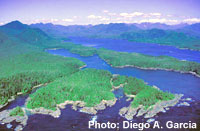 Environmentalists are vowing to fight a plan they will renew logging in Clayoquot Sound, an area that has become a landmark in the quest to protect old growth forests on Canada's Pacific Coast. Environmentalists are vowing to fight a plan they will renew logging in Clayoquot Sound, an area that has become a landmark in the quest to protect old growth forests on Canada's Pacific Coast. "For many of us who fought long and hard to ensure the protection of these forests, this is our worst nightmare," said Tzeporah Berman, Program Director of ForestEthics and a coordinator of the Clayoquot protests of the early nineties. Clayoquot Sound was the site of massive demonstrations in 1993 when citizens and environmentalists - attempted to block roads in an effort to keep loggers away. The summer protest became known as the "war in the woods". In 1999, an agreement was reached laying out which areas in Clayoquot could and could not be logged. The Clayoquot Sound Central Regional Board says its plan for future watershed development recognized the need to protect both the environment and local native Indian culture and it will protect areas with high conservation and scenic values. The Board also says overall logging level will be only 15 percent of that permitted at the height of cutting in the late 1980s. View the August 1, 2006 press release from ForestEthics, Greenpeace, Western Canada Wilderness Committee, Sierra Club of Canada BC Chapter, Friends of Clayoquot Sound View the August 1, 2006 Reuters article View the August 2, 2006 Environmental News Service article View the August 2, 2006 Globe and Mail article View the August 2, 2006 CBC News article Sources: ForestEthics, Greenpeace, Western Canada Wilderness Committee, Sierra Club of Canada BC Chapter, Friends of Clayoquot Sound, Reuters, CBC News, Globe and Mail |
|
| Alberta Boreal Forest Species - Extinction Predicted | 09 August 06 |
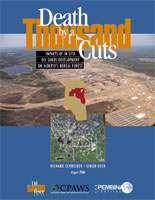 A report released by the Canadian Parks and Wilderness Society (CPAWS) and the Pembina Institute warns that development of Alberta's deep oil sands will drive many boreal wildlife species, including caribou, lynx, marten and some forest bird species to local extinction. A report released by the Canadian Parks and Wilderness Society (CPAWS) and the Pembina Institute warns that development of Alberta's deep oil sands will drive many boreal wildlife species, including caribou, lynx, marten and some forest bird species to local extinction.The report, Death by a Thousand Cuts, is the first assessment that quantifies cumulative impact of Alberta's deep oil sands extraction on forests and wildlife. Although oil sands strip mining near Fort McMurray has received most of the attention , 80% of Alberta's oil sands reserves must be extracted through in situ (in place) techniques. The authors found the typical deep oil sands development - comprised of a network of roads, pipelines and well sites - cuts up the forest into small fragments that cannot sustain wide-ranging species. The authors forecast companies will clear 300,000 hectares of forest and construct over 30,000 kilometres of road in developing current leases. With no public discussion, and no plan in place to protect the forest, the Alberta Government has already leased over 35,000 km2 of boreal forest for deep oil sands development - an area equal in size to Vancouver Island. View the August 1, 2006 CPAWS/Pembina Institute press release View Death by a Thousand Cuts (PDF) View the Death by a Thousand Cuts fact sheet (PDF) View the July 28, 2006 Edmonton Journal article Visit OilSandsWatch.org Sources: CPAWS, Pembina Institute, Edmonton Journal |
|
| Canadians to Build Climate Plan | 4 August 06 |
 The
Climate Action Network/Réseau Action Climat Canada (CAN-RAC) is going on
tour to find out what Canadians want in a plan to address the climate
crisis. "Climate Action Tour 2006" will present a series of workshops
for Canadians
to design a climate action plan. The tour is a response to the federal
government's cut to climate programs and its announced intention to
create a "Made in
Canada Plan". The
Climate Action Network/Réseau Action Climat Canada (CAN-RAC) is going on
tour to find out what Canadians want in a plan to address the climate
crisis. "Climate Action Tour 2006" will present a series of workshops
for Canadians
to design a climate action plan. The tour is a response to the federal
government's cut to climate programs and its announced intention to
create a "Made in
Canada Plan"."There is something happening here -- a climate crisis. They tell us we can't make Kyoto and they are cutting programs to make sure we don't. We've got to stop, think and make our plan," said John Bennett, Executive Director of the Climate Action Network/Réseau Action Climat Canada, who will be conducting many of the workshops. Local CAN-RAC members will host 18 or more workshops in Montreal, Halifax, Toronto, Winnipeg, Saskatoon, Midland, Hamilton, Victoria, Vancouver, Edmonton, Yellowknife and Whitehorse. Manitoba Wildlands is hosting the Winnipeg workshop, September 18, 2006. "We will ask Canadians what want they want done and we will take their views to Ottawa", said Mr. Bennett. "Manitobans are concerned about progress on our 4 year old Climate Action Plan, but also engaged, and ready to contribute to Canada's climate action plan," said Gaile Whelan Enns, director of Manitoba Wildlands. Download the August 1, 2006 Canadian Press article View the August 2, 2006 CAN-RAC press release Visit the national Climate Action Tour web site Visit the Climate Action Network Canada (CAN-RAC) web site Source: Climate Action Network Canada |
|
| Labrador Métis Court Victory | 2 August 06 |
 In a decision handed down July 19, 2006 the Hon. Justice Robert Fowler of the Supreme Court of Newfoundland and Labrador said the Government of Newfoundland and Labrador "had and continues to have an ongoing duty to engage in meaningful consultation with the Labrador Métis people as represented by the Labrador Métis Nation" (LMN), and that the failure to do so "is not justified." In a decision handed down July 19, 2006 the Hon. Justice Robert Fowler of the Supreme Court of Newfoundland and Labrador said the Government of Newfoundland and Labrador "had and continues to have an ongoing duty to engage in meaningful consultation with the Labrador Métis people as represented by the Labrador Métis Nation" (LMN), and that the failure to do so "is not justified."The LMN filed court action against the Government of Newfoundland after attempts failed to enter into meaningful consultations on development of Phase III of the Trans-Labrador Highway. The court proceedings wrapped up last fall in Happy Valley-Goose Bay. Labrador Métis Nation President Chris Montague is calling on the Government of Newfoundland and Labrador to immediately enter into meaningful consultations with the LMN on resource and other land developments taking place or proposed for the region. Montague is also calling on the Government of Canada to begin a process of entering into formal negotiations on a land claims agreement with the Labrador Métis. Download the July 20, 2006 Labrador Métis Nation press release (DOC) Download the July 19, 2006 Supreme Court of Newfoundland and Labrador ruling (DOC) Visit the Labrador Métis Nation web site Source: Labrador Métis Nation |
|
| National Canoeist Supports East Side Protection | 01 August 06 |
 After paddling 3,000 km since April solo canoeist Jay Morrison was greeted in Winnipeg by Manitoba Conservation Minister Stan Struthers and Canadian Parks and Wilderness Society (CPAWS) Manitoba chapter director Ron Thiessen. After paddling 3,000 km since April solo canoeist Jay Morrison was greeted in Winnipeg by Manitoba Conservation Minister Stan Struthers and Canadian Parks and Wilderness Society (CPAWS) Manitoba chapter director Ron Thiessen. Morrison, a CPAWS national board member and former national triathlon team member, stopped in Winnipeg to voice his support for CPAWS efforts for new boreal protected areas on the east side of Lake Winnipeg. Morrison and Thiessen presented Minister Struthers with a special canoe paddle inscribed "Protect Manitoba's Big Wild - East Side Lake Winnipeg." "We're asking the Manitoba government to put boreal conservation and local communities first by living up to their promise to support community driven land-use planning. And it's time for the Manitoba government to act on its commitments to a World Heritage Site by protecting large, intact boreal forest lands, as requested by local First Nations," says Thiessen. "It's essential that these actions are completed before any new industrial developments such as logging and mining." "With a quarter of the Earth's remaining intact forests in Canada, it's our responsibility to ensure big wild boreal places like the east side of Lake Winnipeg are protected, because they're an essential part of the Earth's life support system," said Morrison. View the August 1, 2006 CPAWS Manitoba News Release View the August 2, 2006 Winnipeg Free Press article (DOC) View the August 2, 2006 Winnipeg Sun article Take Action and Protect Manitoba''s Big Wild! Source: CPAWS Manitoba |
|
| Wuskwatim Environmental Licence Appeals | 26 July 06 |
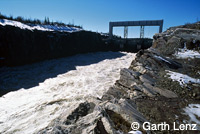 Over 40 letters were filed for the July 21, 2006 licence appeal deadline for the Manitoba Environment Act Wuskwatim Transmission Line Project. Over 40 letters were filed for the July 21, 2006 licence appeal deadline for the Manitoba Environment Act Wuskwatim Transmission Line Project.The June 21, 2006 Manitoba Government announement of the environmental licences for the Wuskwatim Transmission and Generation projects triggered appeal periods for the licences. The appeal period for the Wuskwatim Transmission Line Project is 30 days, as a Class 2 project under Manitoba's Environment Act. The appeal period for the Wuskwatim Generating Station Project is six weeks. It closes August 2, 2006. Both appeal periods are discretionary under the Act, with minimums applied. More appeal letters are expected to be filed regarding the Manitoba Environment Act Wuskwatim Generation Station Project licence. Any person may appeal an Environment Act Licence by submitting a written explanation for the appeal. The letter must be addressed to the Director of Environmental Assessment and Licensing Branch, Manitoba Conservation and can also be addressed to the Minister. Appeal letters are posted to the public registry. View the June 21, 2006 Environmental Licence for the Wuskwatim Transmission Line Project (PDF) View the June 21, 2006 Environmental Licence for the Wuskwatim Generating Station Project (PDF) View the June 21, 2006 Conservation Minister letter on the appeals (PDF) View Manitoba Wildlands' July 21, 2006 appeal of the Wuskwatim Transmission Line Project environmental licence (PDF) View Manitoba Wildlands information on the Wuskwatim appeals Source: Government of Manitoba |
|
| Less Talk, More Action on Climate Change: Canadians | 26 July 06 |
 Poll results released July 20, 2006 by WWF Canada show that 82% of Canadians are fed up with talk and debate about climate change and want practical solutions. 70% of Canadians feel that the need for action is urgent, and that we are almost at the point of no return. Poll results released July 20, 2006 by WWF Canada show that 82% of Canadians are fed up with talk and debate about climate change and want practical solutions. 70% of Canadians feel that the need for action is urgent, and that we are almost at the point of no return.A majority of the Canadians polled are convinced that global warming poses an urgent threat, to themselves and their families. Further, 58 per cent think important issues like health and education won't matter if the global warming problem is not solved. Almost 60 per cent of Canadians think that the oil and gas industry is the real problem that needs to be tackled to solve global warming. "Canadians see no tangible evidence of federal government action on fossil fuel pollution and are clearly getting frustrated," said Julia Langer, director of WWF-Canada's Global Threats program. "Any global warming plan that does not cap greenhouse gas emissions from the fossil fuel, industrial, transportation and building sectors in time to meet the Kyoto Protocol target will continue to fail the public credibility test." View the July 20, 2006 WWF Canada press release View the WWF Global Warming Poll Summary (PDF) Source: WWF Canada |
|
| Canada Votes "No" - UN Declaration | 26 July 06 |
 The newly established United Nations Human Rights Council has adopted the UN Declaration on the Rights of Indigenous Peoples that has been debated for 11 years. The newly established United Nations Human Rights Council has adopted the UN Declaration on the Rights of Indigenous Peoples that has been debated for 11 years.In the June 29, 2006 vote, the 47-member Council adopted the Declaration by a vote of 30 in favour, 12 abstentions and 2 against (3 absent). Canada's new federal government led the opposition to the Declaration. Russia was the only other nation to vote against the Declaration. A Canadian delegate told the Council the Declaration would have "no legal effect" in his country - once a champion of the project. Indigenous coalition representatives say they believe the opposition was largely driven by concern over the potential loss of state control over how natural resources, such as oil, gas and timber, are exploited. Experts have said the legal standards and rules adopted through an international declaration would ensure respect for the human rights and fundamental freedoms of indigenous peoples. Some States have disagreed with indigenous peoples having the right to "self determination" Currently, the UN estimates that there are approximately 370 million indigenous peoples living in different parts of the world. The 18-page declaration calls on governments to introduce laws to underpin its provisions. It will go to the UN General Assembly in New York for final approval, probably September 2006. View the UN Declaration on the Rights of Indigenous Peoples (DOC) View the June 30, 2006 Reuters article View the July 6, 2006 Georgia Straight article View the July 11, 2006 CBC North article View the June 27, 2006 ABC News article Sources: United Nations, ABC News, Reuters |
|
| Confusion Over OlyWest Hearings | 20 July 06 |
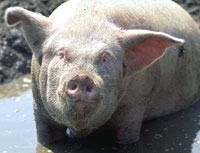 According to media reports, the Manitoba Government has committed that public hearings will be held to review the controversial OlyWest Hog Plant, proposed for the St. Boniface Industrial Park in Winnipeg. The Clean Environment Commission (CEC) - the agency whose mandate includes providing opportunities for the public to participate in environmental assessments in Manitoba - recently indicated on its web site that the Minister of Conservation has yet to refer the matter to the CEC. According to media reports, the Manitoba Government has committed that public hearings will be held to review the controversial OlyWest Hog Plant, proposed for the St. Boniface Industrial Park in Winnipeg. The Clean Environment Commission (CEC) - the agency whose mandate includes providing opportunities for the public to participate in environmental assessments in Manitoba - recently indicated on its web site that the Minister of Conservation has yet to refer the matter to the CEC.The CEC only holds hearings concerning an environmental proposal if it receives an official referral from the Minister of Conservation instructing the CEC to proceed. Prior to a referral, the Department of Conservation must receive a proposal under the Environment Act from the proponents, which triggers several stages in the environmental assessment process. OlyWest has already held 'environmental assessment' public open houses in Winnipeg, Manitoba, Canada. A scoping document underwent public review - the final version will contain environmental standards, which the proponents must meet when they file their environmental impact statement for the proposal under the Environment Act. When a hearing is called, information will be posted on the Clean Environment Commission website and with notices in the media. View the Clean Environment Commission news on the OlyWest Hog Plant View the May 1, 2006 Manitoba Wildlands news item on OlyWest Visit the OlyWest Proposal Envrionmental Assessment website Visit Stop the Stink Source: Clean Environment Commission |
|
| Water Project Hearings Delayed | 20 July 06 |
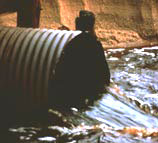 The Panel appointed by the Clean Environment Commission (CEC) to conduct a hearing regarding the Pembina Valley Water Cooperative (PVWC) Groundwater Supply System has determined the information provided by the proponent is insufficient to proceed with a hearing. The Panel appointed by the Clean Environment Commission (CEC) to conduct a hearing regarding the Pembina Valley Water Cooperative (PVWC) Groundwater Supply System has determined the information provided by the proponent is insufficient to proceed with a hearing.The CEC's decision echoes comments by the public (including Manitoba Wildlands) filed during the public comment period that closed February 6, 2006. The CEC Panel has requested assistance from the Environmental Assessment and Licensing Branch to facilitate the collection of additional information from the Proponent before the hearing process progresses any further. Gaile Whelan Enns, director Manitoba Wildlands, indicated, "additional project information filed by PVWC must be available for public review also." The Pembina Valley Water Cooperative proposes to move groundwater, by pipeline, from the Sandilands aquifer on the east side of the Red River into their distribution network via a pumping station at Morris, Manitoba, on the west side of the river. View the Clean Environment Commission web page on the PVWC Hearing View Manitoba Wildlands information on the PVWC Groundwater Supply System View the February 9, 2006 Manitoba Wildlands PVWC news item Sign up for CEC updates on hearings processes Source: Clean Environment Commission |
|
| G8 Summit Falls Short on Climate Change | 20 July 06 |
 The G8 fell short on delivering serious action on climate protection in its final communiqué from St Petersburg, according to WWF International. The global conservation organization called on Germany to deliver a serious climate and energy plan when it holds the next G8 heads of state summit next year. Similarly, Greenpeace International rejected claims made in the G-8 Heads of State Communiqué. The G8 fell short on delivering serious action on climate protection in its final communiqué from St Petersburg, according to WWF International. The global conservation organization called on Germany to deliver a serious climate and energy plan when it holds the next G8 heads of state summit next year. Similarly, Greenpeace International rejected claims made in the G-8 Heads of State Communiqué.The Global Youth Coalition Against the "Plan of Action on Global Energy Security" released a statement July 10th that criticized the leaked June 3rd draft Plan of Action on Global Energy Security for defining "energy security as being able to provide for growing energy demands through fossil fuels and nuclear energy". WWF was pleased that renewable energy and energy efficiency measures are now seen as a central part of the G8's strategy to meet long term energy demands. The G-8 also acknowledged that climate change is a challenge and reiterated their commitments to the objective of stabilizing greenhouse gas concentrations in the atmosphere at the level that prevents dangerous human interference with the climate system. View the July 16, 2006 G8 statement on Global Energy Security View the July 16, 2006 WWF International news item View the July 17, 2006 Greenpeace International press release View the July 10, 2006 statement from Global Youth Coalition View the July 19, 2006 OneWorld.net article View the July 17, 2006 InTheNews.co.uk article Sources: WWF International, Greenpeace International, G8 Communiqué, People and Planet |
|
| Grassy Narrows - Court Victory & Blockade Arrests | 18 July 06 |
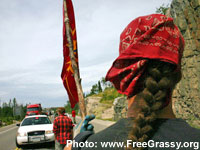 Two days after a peaceful protest Thursday, July 14th, which blocked the Trans-Canada highway bypass north of Kenora, the Ontario Provincial Police set up checkpoints on the highway into Grassy Narrows First Nation and arrested nine protesters. Those arrested included members of Six Nations who had come to participate in a gathering as guests of the Grassy Narrows community. Two days after a peaceful protest Thursday, July 14th, which blocked the Trans-Canada highway bypass north of Kenora, the Ontario Provincial Police set up checkpoints on the highway into Grassy Narrows First Nation and arrested nine protesters. Those arrested included members of Six Nations who had come to participate in a gathering as guests of the Grassy Narrows community.The highway blockade was the latest in a decade-long effort by the Grassy Narrows First Nation to end logging without consent on their traditional territory. Supporters of environmental and social justice blocked the path of logging trucks taking hardwood trees clear-cut without consent from Grassy Narrows' traditional territory to the Weyerhaeuser Timberstrand mill in Kenora. The band has maintained a blockade on Highway 671 (within the First Nation's traditional lands) for three years, to keep logging trucks out. Grassy Narrows First Nation can claim victory in a Superior Court of Ontario ruling handed down late June. The court ruled that the Province must pay the Band's legal costs in connection with the now decade-long court battle over their dispute with the Province and Abitibi Consolidated over harvesting practices. Recent events are the latest in a serious of environmental and social challenges Grassy Narrows has faced. In the 1960s, the First Nation was uprooted by Indian Affairs Canada. In the 1970s, several tonnes of inorganic mercury from an upstream pulp and paper mill contaminated the water and fish the community depends upon. Effects of the mercury poisoning continue today. Grassy Narrows has also lived through ongoing flooding of their traditional lands and wild rice fields by Ontario Hydro, threats to dump nuclear waste on their traditional lands, and residential schools. View the July 16, 2006 Winnipeg Free Press article(DOC) View July 15, 2006 ForestEthics press release View July 15, 2006 Friends of Grassy Narrows press release View 2003 First Nations Drum article highlighting environmental history of Grassy Narrows View CBC feature Mercury Rising: The Poisoning of Grassy Narrows View previous Manitoba Wildlands news items on Grassy Narrows: April 25, 2006, Grassy Narrows and Shareholders Battle Weyerhaeuser March 7, 2006, Grassy Narrows Headed for International Standoff Sources: Winnipeg Free Press, ForestEthics, Friends of Grassy Narrows, First Nations Drum, CBC, Rainforest Action Network |
|


 RSS Feeds:
RSS Feeds: